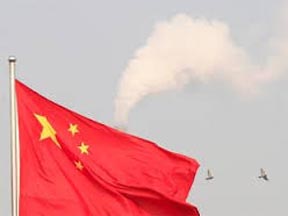 BEIJING: China’s fiscal revenue growth dipped to a 23-year low of 8.6 per cent last year due to a slump in the demand in the world’s second largest economy and a fragile global market, raising concerns of a prolonged slowdown.
BEIJING: China’s fiscal revenue growth dipped to a 23-year low of 8.6 per cent last year due to a slump in the demand in the world’s second largest economy and a fragile global market, raising concerns of a prolonged slowdown.
Chinese Finance Ministry said fiscal revenue stood at 14.04 trillion yuan (USD 2.3 trillion) compared to USD 2.11 trillion in 2013.
China’s economy grew 7.4 per cent last year — its weakest expansion in 24 years.
The fiscal revenue was hurt by weak factory output, consumption, investment and corporate profits, said the ministry.
Besides posting its lowest growth since 1990, Chinese economy also missed the official target of 7.5 per cent in 2014 for the first time in recent years, rising concerns about a prolonged slowdown.
An IMF forecast said China’s growth would fall below seven this year as it was expected to further decline to 6.8 this year and 6.3 next year.
Prices at factory gates have seen consecutive monthly declines, which also contributed to the drop in fiscal revenue growth.
A weak housing market and tax cuts also weighed on fiscal revenue.
Last year, fiscal expenditure rose 8.2 per cent from a year earlier to 15.17 trillion yuan.
Expenditure on education saw a rise of 4.1 per cent; on science and technology 3.4 per cent; medical services 9.8 per cent; social security and employment 9.8 per cent; and on housing 10.9 per cent, state-run Xinhua news agency reported.
This year it is expected China will continue to face slower growth in fiscal revenue and rising fiscal expenditure, due to a weakening economy, the country’s urbanisation drive and industrial structure adjustments that need funding, said Gao Peiyong, a fiscal expert with the Chinese Academy of Social Sciences.
Finance Minister Lou Jiwei said at a national work meeting last month that fiscal revenue will grow at a medium-to-low speed in the years to come.
Despite slower growth in fiscal revenue, China pledged to stick to a proactive fiscal policy in 2015 while making it more forceful, which means the government will do its best to reduce tax burdens on companies and continue to improve people’s lives.–PTI





